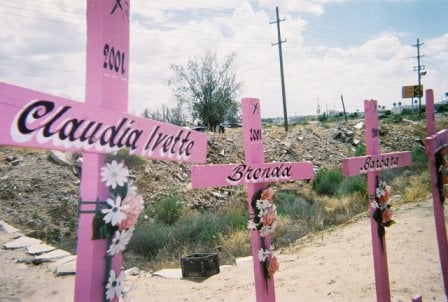Officials in the state of Chihuahua recently announced their plans to exhume the remains of more than 4,000 unidentified bodies buried in common graves in Ciudad Juarez, after beginning a similar process in Chihuahua City. Although local authorities deny a direct link to the murders and disappearances of several hundred local women in the past 14 years, the victims’ families are hoping independent investigators will be allowed access to the remains in order to provide some answers.
Since 1993, approximately 400 young women have been murdered in Juare z, a factory town across the U.S. border from El Paso, Texas. Authorities have brought charges in some cases, but activists and victims’ families have contended that the accused in many cases are scapegoats, sometimes wrongly imprisoned or themselves victimized by questionable investigations, while the true culprits have not been held accountable.
z, a factory town across the U.S. border from El Paso, Texas. Authorities have brought charges in some cases, but activists and victims’ families have contended that the accused in many cases are scapegoats, sometimes wrongly imprisoned or themselves victimized by questionable investigations, while the true culprits have not been held accountable.
The victims of the ongoing “femicides” have been young women, many of whom work in the maquiladoras (or assembly plants) that line the streets of Juarez. Many young women come from other parts of the country to seek employment in the factories, a large number of which are owned by U.S. companies taking advantage of the North American Free Trade Agreement (NAFTA) since its implementation on January 1, 2004. Many girls and young women work night shifts, taking buses or walking long distances in the dark, when some of the crimes have occurred. Some bodies have been found dumped in fields together; several have not been found at all. The violence has spread beyond Juarez, with similar cases arising further south in Chihuahua City.
Many of the victims’ mothers have organized to seek justice and raise awareness of the femicides. Through organizations such as Justicia para Nuestras Hijas (Justice for our Daughters), the mothers are taking their fight abroad, hoping that international awareness will lead to greater pressure on the Mexican government. In a show of support, the U.S. House and Senate passed a resolution in May of 2007 condemning the violence in Juarez and advocating for the issue to become part of the bilateral agenda between the U.S. and Mexican governments.
President Felipe Calderon supported a new national law earlier this year that calls for integrated federal, state, and local programs involving Mexican police, media, courts, and schools to identify and combat violence against women. The law contains several measures aimed at domestic violence. Although Calderon had pledged as a candidate to resolve the killings, his administration eliminated a special commission originally organized to investigate the matter. The commission merged with Inmujeres, an organization responsible for all crimes against women nationwide.
Photo: A memorial in Juarez, in honor of the victims (Photo by the author, who traveled to Juarez in 2005 on a delegation that examined this issue through meetings with victims’ mothers, NGO leaders, and government representatives.)